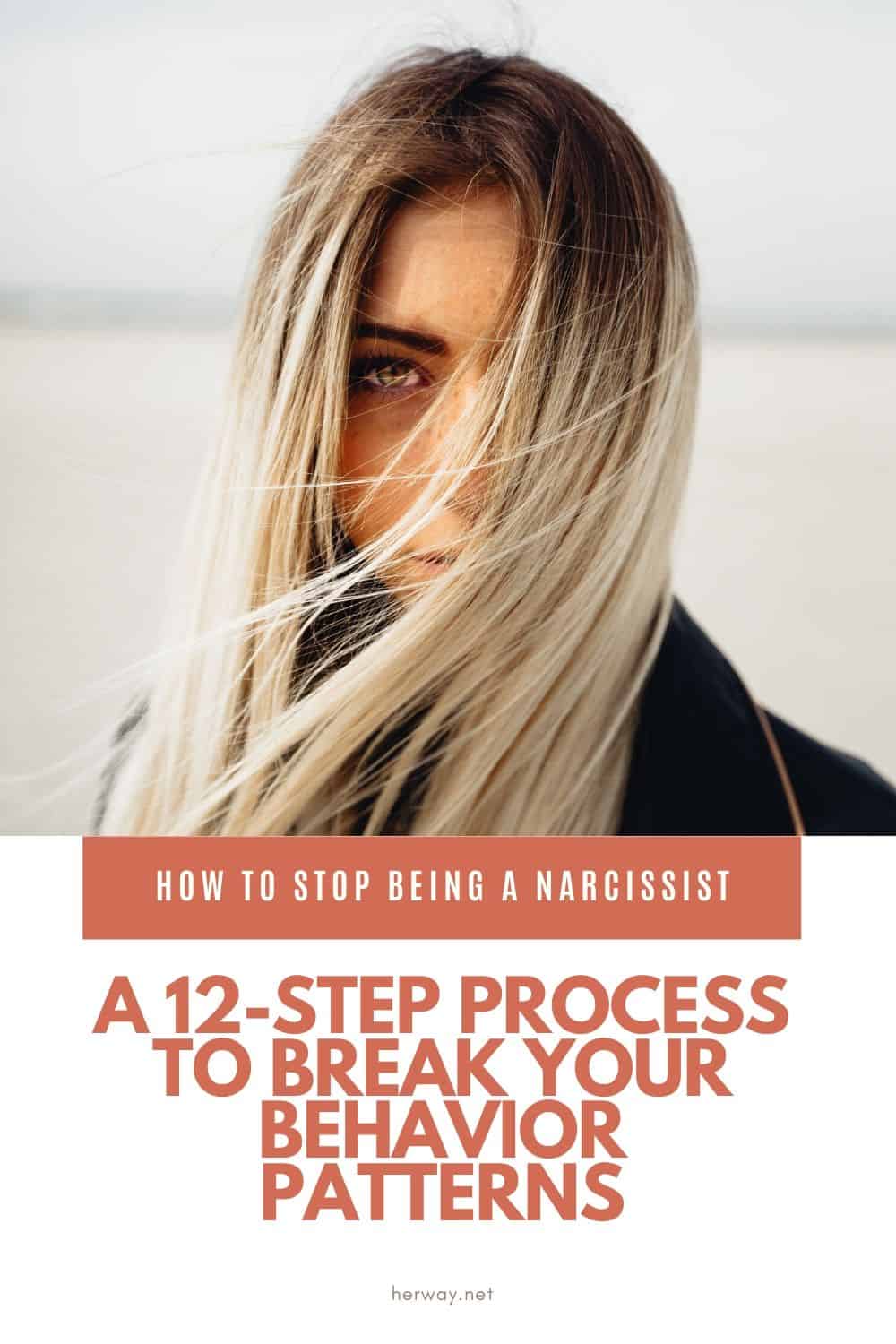How To Stop Being A Narcissist: A 12-Step Process To Break Your Behavior Patterns
As long as you’re trying to figure out how to stop being a narcissist, congratulations—you’re one step ahead.
It means you’re at least becoming aware of your problem, which can’t be said for most of your peers who are narcissists.
It doesn’t matter whether you recognized the symptoms of narcissistic personality disorder on your own or a mental health professional told you that you suffer from NPD, reading all these things about yourself is scary.
So, let me give you a little bit of hope; you can be cured and you can change, despite what ignorant people might be telling you.
No, it won’t be easy but it can be done. If you just read on, we’re offering you the answer to the question: ‘How to stop being a narcissist?’
1. Admit that you have a problem

The number one problem with most people with narcissistic tendencies and the ones who suffer from any mental condition in general is the fact that they deny having a problem.
Everyone around them keeps telling you that you should get some treatment and that it’s about time to make some changes to your character but you simply can’t get it in your head.
Instead, you justify your toxic behavior and blame your entire surroundings for your actions.
In fact, even when you notice that something is off, you observe it is as an episode and refuse to face the truth—that you’re suffering from a serious NPD and that something has to be done about it.
Yes, saying: “I’m a narcissist,” for the first time is hard work but you have to do it. However, you can’t ask yourself: “How do I stop being a narcissist?” unless you say, “I’m a narcissist,” first.
Before you make any concrete moves, firstly, you have to accept this reality. Don’t worry—there is no shame in it and you will manage to handle your disorder if you start with healing yourself in the healthiest way possible.
2. Be willing to accept change

They say that people don’t change after a certain age, that we all basically stay who we essentially are, that we have the ability to adapt to a certain situation but that sooner or later, our true colors will swim back to the surface, as much as we try to control them.
Well, there is something missing in this commonly used phrase—people don’t change unless they want to.
They don’t do it to please someone else or under any kind of pressure—they only do it when they feel it’s the right thing to do.
So, that’s the difference between you and anyone else and that’s why you’ll succeed—you’re the one who really decided to change your ways.
Therefore, you have to be willing to change. You have to be open to this new you who will arise from this process; you’ll have to love and accept yourself like never before.
3. Get to the root of your narcissism

Now that you’ve made up your mind and are certain about sticking to your decision, it’s time to start exploring your narcissistic personality disorder a little bit deeper.
I warn you—you’ll have a hard time doing so; after all, nobody likes digging through their old emotional wounds but it has to be done if you expect any kind of progress.
The main question here is: “What made you become a narcissist and have these narcissistic tendencies?” No, you weren’t born with the narcissistic traits you have today; your true self was turned into this toxic person.
First and foremost, let’s go back to your early childhood.
Don’t get me wrong—I’m sure your parents did the best they could do to raise you properly but sometimes, they can be the ones who caused your narcissistic personality disorder.
Did you feel loved enough during your upbringing? Or did you feel loved too much?
Yes, either insensitive or oversensitive parenting can be the reason someone becomes a narcissist.
Other causes can be too many expectations or constant criticism. Maybe you never developed your self-esteem the right way so you tried escaping into narcissism.
Also, any kind of abuse, including emotional or verbal, can be the root of your narcissistic personality disorder.
Whatever it is in question, once you get to the bottom of your traumas, this time, stop running away from them. For a change, do your best to process them and try leaving them in the past, where they belong.
4. Learn what triggers you

The next step also includes a lot of introspection, self-help and self-awareness because this is when you’ll learn about your triggers.
What has to happen for you to become like this because you certainly don’t display your narcissistic behavior all the time? What makes you react the most and what turns you into a toxic person?
Some narcissistic people are triggered by people telling them, “No,” and some react negatively when they feel threatened or intimidated or when their confidence is shook, while others can’t stand criticism.
Therefore, it’s your job to get to the bottom of your personality and see what concerns you the most. This way, you’ll have a better understanding of your actions and you’ll be able to control them more.
Have in mind that all people have certain triggers.
However, the difference between you and the rest of the world is that you stop being in charge of yourself the moment you are ‘provoked’, you shut off completely and your narcissistic self appears on the scene.
5. List your narcissistic behaviors

Once you’ve finished with the root of your issue and your triggers, go on and list the types of behaviors you connect with narcissism as well.
Sometimes you might not even be aware of those behaviors so maybe your list should include the things your closest ones have been paying attention to.
How do you react when triggered?
Do you have an anger outburst the moment someone in your surroundings doesn’t give you the response you expected, do you go all passive-aggressive on them, do you engage in emotional manipulation or do you just emotionally withdraw and ignore them?
If necessary, observe yourself for a certain amount of time to get the real result. Get yourself a diary in which you can write about specific situations—what brings you to your narcissistic behavior and how you react.
6. Make an action plan

The next step after writing your diary would be making a plan. You accepted your mistakes, you took full responsibility for them and now it’s time to do something so they don’t happen ever again.
Therefore, it’s your job to imagine your perfect response and reaction to a certain situation.
Go back through the events in which you missbehaved and ask yourself if things could be improved, whether there could have been a different outcome if you had been different and if there is a way to build healthy relationships with your loved ones.
I won’t lie to you—you won’t start acting all nice and perfect overnight. After all, this doesn’t mean that you’re not allowed to be angry or sad from time to time; these are all basic human reactions.
However, it will be much easier for you to take charge of your narcissistic behavior if you have this plan somewhere in the back of your head. Trust me—before you know it, you’ll catch yourself acting on it.
7. Work on your low self-esteem

What most people don’t know is that one of the symptoms of narcissistic personality disorder is an extremely fragile ego.
Yes, you appear to be so full of yourself and pretend that you have this huge self-esteem and the best possible self-image but actually, the truth is quite different.
The problem with NPD is that your confidence depends on other people’s opinions and you take advantage of others to get the praise you desperately need.
Seeking validation is actually your narcissistic supply, something you can’t function without.
Well, if you’re figuring out how to stop being a narcissist, the best way to do so is to start working on your low self-esteem.
However, I’m talking about different kinds of self-esteem here—about ones which are not related to your ego. It means improving your self image and the way you perceive yourself.
It means feeling good about yourself, without depending on what everyone else has to say.
8. Become aware of your actions

Other things to build on besides your self-esteem are definitely mindfulness and self-awareness. This means being fully aware of your actions and the way they affect you and the other people around you.
For as long as you can remember, you put yourself in first place; you were self-centered and took care of your own needs only.
Due to your sense of self-importance and being prone to grandiosity, you were only concerned about the things which have a direct impact on your feelings or ego and you never cared about the consequences your behavior might leave on others.
Well, it’s time to change that.
Don’t get me wrong—I’m not saying that you should spend the rest of your life overthinking your every move before actually doing something about it but you certainly have to become more thoughtful when it comes to your actions and the way others handle them.
9. Find a way to delay your narcissistic behavior

I won’t lie to you—as much as you try, you can’t become your true self overnight.
You can have an epiphany but you won’t wake up the next morning, after reading this step by step guide, with someone else’s mind and heart in your yesterday body.
Nevertheless, that doesn’t mean that you shouldn’t make any progress. In fact, just take baby steps, one at a time and before you know it, you’ll reach your goal and see for yourself how to stop being a narcissist.
Therefore, there is this great practice you can start your journey with. Instead of magically killing or erasing all of your narcissistic impulses, at least give your best to delay your narcissistic behavior.
Instead of looking at the bigger picture all the time, concentrate on one situation at a time.
Your goal is to control yourself in a given moment, without thinking about what might happen the next time you find yourself in a similar situation.
Whenever you feel an anger outburst or an emotional blackmail episode coming on, try breathing in and out slowly for a couple of seconds and try counting to ten before saying anything or making any more breaths.
This way, you’ll manage to calm your body, mind and heart and you’ll be more in charge of yourself.
10. Practice empathy and kindness

All people suffering from this disorder share one narcissistic trait—they suffer from a lack of empathy and they have a hard time sympathizing with others.
They think they’re the only ones who matter in this world and they rarely take other people’s feelings or viewpoints into account and nor do they give a damn about the needs of others.
If this is something you can relate to, you’re probably wondering how to stop being a covert narcissist.
Well, that has to change one way or another. Nevertheless, the good news is that empathy, like most other things, can be practiced.
From now on, every time before you act on a certain thing, try thinking how the recipient of your words and actions might feel.
It doesn’t matter whether you are about to display your toxic behavior or you plan on being nice—just put yourself in their place and see whether you’d like someone treating you that way or not.
If you don’t succeed in doing this in the middle of your episode, rethink the entire situation once you get calmer and try walking a mile in the victim of your narcissistic abuse’s shoes. It’s not pleasant, is it now?
Well, you’re the only one who can end it.
An important step toward putting an end to this lack of empathy is kindness. Instead of just perceiving other people’s negative emotions, focus on the good ones as well.
For a change, be kind to someone else, without expecting anything in return and without it being a part of your sneaky plan you’re yet to reveal.
Try figuring out how these people you treated nicely feel and focus on how being the reason for someone’s smile makes you feel.
11. Stop putting others down

Another symptom of narcissism is the grandiosity, sense of superiority and self-importance over everyone around you—your coworkers, best friends and closest family members.
A narcissistic trait is having this sense of entitlement and thinking you’re above everyone else, which often results in narcissistic abuse.
Actually, your sense of self-love comes from taking advantage of others and using your loved ones to give you compliments and make you feel like they’re below you.
Guess what? They’re not!
Even if you disagree with someone, that doesn’t make you smarter or more wise.
Even if you’re better looking or earn more money, you shouldn’t have this sense of entitlement and nor should you feel like you’re the privileged one.
Remember that we talked about empathy?
Well, the next time you try ruining someone’s self-confidence in order to get your narcissistic supply or feel that your sense of superiority is about to take over, wait a second and ask yourself how the victims of your narcissistic abuse feel.
12. Ask for professional help

While figuring out how to stop being a narcissist, you’re convinced that your loved ones, including your closest friends, coworkers and family members, are all the help you need in this self-healing process.
Even though seeking support from them is a huge step toward your recovery, sometimes you need professional help with this issue—and that is nothing you should be ashamed of.
There are mental health professionals with a PhD on this and similar matters, so they will without a doubt know how to help you with your problem the right way.
Don’t worry—nobody will judge you there but nobody can do the dirty work for you.
Instead, they will just show you the way, take your head through this tunnel all the way toward the light and, most importantly, give you the answer to the question: ‘How to stop being a narcissist?’








